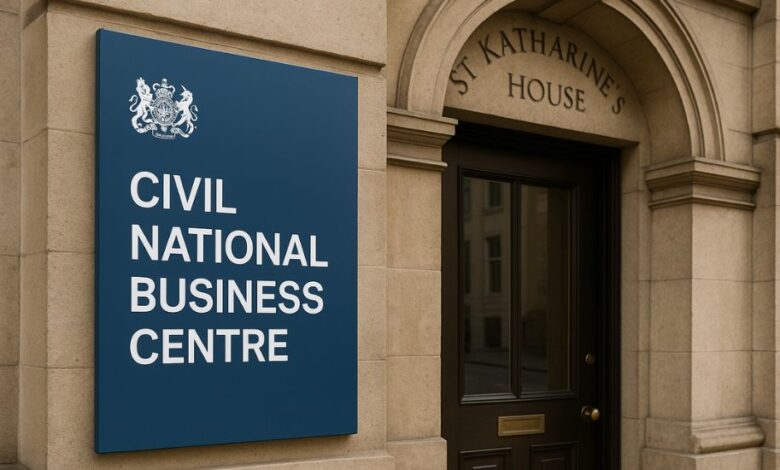Understanding the Civil National Business Centre

The Civil National Business Centre (CNBC) is a centralised hub within the English and Welsh civil justice system. Operated by HM Courts & Tribunals Service (HMCTS), it is based in Northampton and handles money claims, civil business paperwork, and online filings. It replaced the former County Court Business Centre and County Court Money Claims Centre, bringing together their functions under one roof.
For many people, the name appears unexpectedly — often on a letter or a County Court Judgment (CCJ) record — leaving them unsure of what the Centre is or how to contact it. This article explains everything you need to know about CNBC’s email contacts, CCJs, payment procedures, reviews, and the webchat service.
CNBC Email: Contacting the Centre
Official channels
The CNBC manages a wide range of case types, but it does not offer a single public email address for every enquiry. Instead, specific departments have dedicated contact routes. The most recognised route for digital claims is through the Money Claim Online (MCOL) helpdesk email address, which handles technical and case-specific questions.
For paper responses, correspondence is sent to the CNBC postal address at St Katharine’s House in Northampton. This remains the central point for forms such as N1 (claim form), N9 (acknowledgment of service), and other paper filings.
Practical points
-
The CNBC generally prefers that members of the public use the contact form or webchat rather than general email.
-
Any email sent should always include the claim number, full names of the parties, a clear summary of the issue, and up-to-date contact details.
-
Without this information, staff cannot easily trace the file, which may delay a response.
Because email support is limited, many users find that the webchat or telephone helpline provides a faster reply for straightforward queries.
CNBC and CCJs: What It Means When You See a Judgment from CNBC
The Civil National Business Centre is frequently listed as the issuing court on County Court Judgments. This happens because CNBC is the administrative centre for claims started online or in bulk by businesses and solicitors.
What a CNBC CCJ signifies
A CCJ from CNBC carries exactly the same legal weight as one from any other county court. The difference is purely administrative: the claim was issued electronically through the central system rather than by a local court.
If a defendant fails to respond to a claim within the required time limit, the claimant can request a default judgment, which CNBC issues automatically. That judgment then appears on the defendant’s credit file for six years unless paid within one month.
Steps to take if you receive a CNBC CCJ
-
Check the paperwork carefully. Confirm the claim number, claimant’s details, and date of issue.
-
Respond within the deadline. Defendants have 14 days to reply or 28 days if they acknowledge service.
-
Apply to set aside if you never received the claim or believe it was wrongly entered.
-
Pay promptly if the debt is correct; payment within one month prevents the CCJ from appearing on your credit record.
-
Keep evidence of payment or correspondence for future reference.
Common concerns
Online discussions show that many people are confused when they first see “Civil National Business Centre” on official papers. They may not recognise the name, assume it is a private company, or fear it is a scam. In reality, CNBC is a government-run court office, and correspondence from it is legitimate.
When writing about this issue, it’s useful to clarify that the CNBC label simply identifies the issuing centre — not a separate court with new powers.
Reviews and User Experiences of the Civil National Business Centre
Public opinion on the CNBC is mixed. The centre’s creation aimed to simplify civil-case processing, but users’ experiences vary widely.
Critical perspectives
A large number of forum posts and blog comments express frustration with communication and delays. Common themes include:
-
Long processing times for paperwork.
-
Difficulty reaching staff by phone.
-
Confusion over email or postal addresses.
-
Generic responses that do not answer specific questions.
Defendants especially report that by the time they understand what has happened, a judgment may already have been entered. This has led to complaints that the centralised system can feel impersonal.
Positive developments
Despite the criticism, there have been improvements. The introduction of a live webchat service has made it easier for many users to get quick updates. Official performance reports indicate that average call-waiting times and processing delays have reduced compared with earlier years.
Some solicitors and frequent court users also note that, once a case officer responds, communication is generally professional and clear.
Overall assessment
Reviews suggest that the Civil National Business Centre is still evolving. It has succeeded in unifying many procedures and enabling faster electronic claim issuance, but it continues to face challenges in volume management and customer service. Balancing efficiency with accessibility remains its biggest task.
Payments and Fees Handled by the Civil National Business Centre
Payment is central to almost every process the CNBC manages — from issuing claims to settling judgments and enforcing debts.
Paying court fees
When a claimant starts a case online through Money Claim Online, the appropriate court fee must be paid immediately. The fee amount depends on the value of the claim and can be paid by debit or credit card.
For paper claims sent by post, payment may still be made by cheque or postal order payable to HM Courts & Tribunals Service. The CNBC only processes a claim after confirming that the correct fee has been received.
If a party cannot afford the fee, they may apply for assistance under the “Help with Fees” scheme, providing evidence of income and savings.
Paying a judgment or settling a debt
If a CCJ has been issued by the CNBC, the debtor must pay the claimant directly, unless the judgment specifies otherwise. Proof of payment should always be obtained to demonstrate satisfaction of the judgment.
Payment within one month removes the entry from credit files. After that period, it is marked as “satisfied” but remains visible for six years.
Enforcement payments
The CNBC also processes applications for enforcement orders such as attachment of earnings or charging orders. Fees apply to these applications, and claimants should factor them into their overall recovery costs.
Practical tips for readers
-
Always double-check the claimant’s details before sending any payment.
-
Keep all receipts or bank confirmations.
-
If unsure, contact CNBC by webchat or phone to confirm the correct reference number.
-
Never send cash through the post.
By explaining these details clearly, your article helps readers avoid common payment errors and ensures transparency around court fees.
Webchat: A New Way to Get Help
The Civil National Business Centre’s webchat service is one of the most significant accessibility upgrades introduced recently. It offers real-time communication with trained advisers without needing to wait on the phone.
How the webchat works
Visitors can access the chat via the official Money Claims or HMCTS portal. Once connected, they are prompted to provide their name, claim number, and question. Typical topics include:
-
“Has my defence been received?”
-
“What is the current status of my claim?”
-
“Which form should I complete for payment by instalments?”
Users usually receive responses within minutes during operating hours. A chat transcript can be saved or printed for record-keeping.
Best practice for using webchat
-
Prepare all details (case number, dates, personal ID) before starting the session.
-
Limit to a few clear questions per chat to help staff answer efficiently.
-
Avoid sending large attachments; the chat is text-only.
-
If the query is complex, request follow-up instructions by email or post.
Benefits and limitations
Advantages:
-
Faster than calling during busy periods.
-
Provides written confirmation of advice.
-
Particularly helpful for users who are hearing-impaired or prefer typing.
Limitations:
-
Not suitable for legal advice or detailed document checks.
-
Availability is limited to working hours.
-
During high demand, the chat may temporarily close or queue users.
Overall, the webchat reflects a modern approach to public service — providing quick, trackable communication without long call waits.
What the Civil National Business Centre Means for You
Whether you are a claimant or a defendant, the Civil National Business Centre is likely to be your main point of contact for civil money claims in England and Wales.
For claimants
-
Submit claims online or by post through CNBC.
-
Pay the correct issue fee to start proceedings.
-
Track case progress using online systems or by contacting the centre directly.
For defendants
-
Respond promptly to any CNBC claim form.
-
Use the acknowledgment of service form if you need extra time.
-
If you believe a claim is wrong, file a defence or seek to set aside the judgment.
-
Keep proof of every step taken.
Why CNBC exists
The merger that created the Civil National Business Centre in 2023 aimed to reduce duplication and improve consistency across civil-case processing. Instead of separate regional offices, there is now a single, nationally managed facility handling millions of claims each year.
This centralisation has simplified electronic filing for claimants and professional users, but for members of the public, it sometimes makes the process feel remote. Understanding how to reach CNBC — by email, phone, payment portal, or webchat — helps bridge that gap.
Final Thoughts
The Civil National Business Centre represents both modernisation and challenge within the UK’s civil-justice landscape. It offers a streamlined route for processing claims and judgments, yet its scale can make individual experiences uneven.
If you find yourself dealing with a CNBC notice or judgment, remember:
-
Verify that it is genuine and keep all paperwork.
-
Respond within required timeframes.
-
Use webchat or helplines for updates.
-
Keep records of payments or correspondence.
By staying organised and informed, individuals and businesses can manage their civil cases more effectively.
At Buzz Vista, our goal is to turn complex legal systems into clear, accessible knowledge for everyday readers. Understanding how the Civil National Business Centre works can help you navigate the process with confidence and avoid unnecessary stress.



